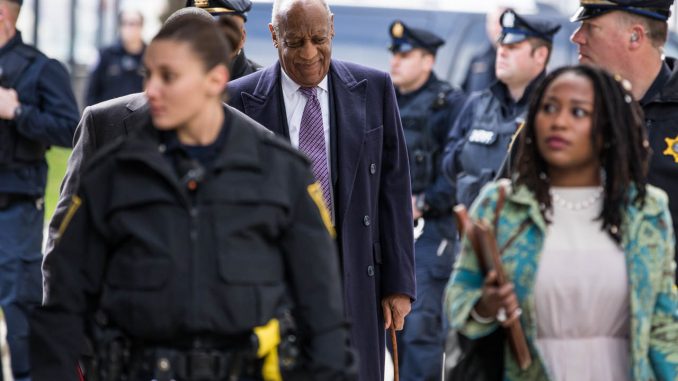
NORRISTOWN, Pa. — A motion by Bill Cosby’s defense team to acquit the former university trustee of sexual assault charges was denied Thursday afternoon, the Associated Press reported.
His defense team argued that the prosecution’s case did not prove Cosby drugged and sexually assaulted Andrea Constand in 2004. The defense also cited there is no evidence that the alleged assault occurred within the 12-year statute of limitations. Cosby was arrested in December 2015.
Montgomery County Court of Common Pleas Judge Steven T. O’Neill denied the motion, along with an earlier motion from the defense calling for a mistrial Thursday morning.
Both the prosecution and defense called toxicology experts on Thursday to discuss Benadryl and quaaludes, which are both drugs Cosby has admitted to giving women.
It has been long debated whether or not Cosby gave Constand quaaludes or the allergy medication on the night of the alleged assault. Constand said she does not know what she was given that night.
Timothy Rohrig, a forensic toxicologist from Kansas, was the prosecution’s final witness as they officially rested their case today. He was also the prosecution’s expert witness in last year’s trial.
Prior to testifying on Thursday, Rohrig was given police reports, statements and depositions related to Constand’s accusation of sexual assault against Cosby.
Most of his testimony focused on the active ingredient in Benadryl: Diphenhydramine. Cosby said he gave Constand Benadryl the night of the alleged assault in the 2005 civil suit deposition.
There is contention between Constand and Cosby about whether he gave her three 25 mg tablets of Benadryl or 1 ½ pills that were split into three small pills.
The prosecution questioned Rohrig on the side effects of the drug, like dryness of mouth, blurry vision and mental clouding, to show the consistencies with some aspects of Constand’s statements.
“The next morning, she said she was a little groggy, so again that hangover effect…all the symptoms she described is consistent with ingestion,” Rohrig said.
Rohrig also concluded that Diphenhydramine has been used for drug-related sexual assault cases in the past.
During the defense’s cross-examination of Rohrig and in questioning their expert witness toxicologist Harry Milman, the team asked whether paralysis and unconsciousness is a side effect of Diphenhydramine. Constand has said that after taking the pills and sipping alcohol, she felt paralyzed.
Milman said that Constand’s description of paralysis, double vision, inability to speak and foaming at the mouth do not match the known effects of Benadryl or quaaludes, combined with sips of alcohol.
Prosecutor Stewart Ryan questioned Milman’s research and expertise in pharmacology, specifically in drug-related sexual assault cases.
Milman told jurors that quaaludes were taken off the market in the 1980s, and how the shelf life of the drug is only one to two years.
Ryan questioned if he thought the drug could have been available in the 2000s illicitly.
“I have no evidence that they were available or not available in the year 2000,” Milman said. “So I cannot make an opinion.”
Ryan then gestured to Steele, and referenced a case in 2002 in Lower Merion Township, when Steele helped seize thousands of Quaaludes.
“Would that change your testimony?” Ryan said.
“Yes,” Milman said.
The defense’s early-morning move for a mistrial Thursday was motivated by the prosecution’s cross-examination of the defense’s key witness and current Temple employee Marguerite Jackson on Wednesday.
Ryan implied that Jackson and defense attorney Kathleen Bliss fabricated Jackson’s statement, citing inconsistencies in Jackson’s statement from 2016 and another from 2018, which Bliss helped draft.
“Did you have any conversation with Kathleen Bliss before the second statement was created?” Ryan asked. Bliss objected several times to the use of the word “create” on Wednesday but was overruled each time.
A defense attorney argued there was no purpose for that line of questioning other than to put an impression in the jury’s mind that the defense counsel engaged in bad conduct.
Read about Marguerite Jackson’s testimony herePrior to the jury settling in, District Attorney Kevin Steele expressed concern that the defense would try to drag the case out longer than necessary by not having enough witnesses prepared. On Thursday, the defense only had one witness.
But O’Neill expressed frustration with the defense for their lack of preparation.
“Once you saw [prosecution’s witnesses] last week, how would you not have witnesses ready?” O’Neill said.
During closing, Steele told the jurors that the testimonies in this trial may end early next week, leaving the case in their hands.
Cosby is charged with three counts of aggravated indecent assault and could face up to 30 years in prison if found guilty of all charges.



Be the first to comment